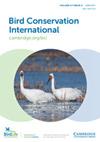Distribution and habitat requirements of the Bahama Warbler Setophaga flavescens on Grand Bahama in 2018
IF 1.5
4区 环境科学与生态学
Q3 BIODIVERSITY CONSERVATION
引用次数: 0
Abstract
Summary The Bahama Warbler Setophaga flavescens is restricted to Grand Bahama and Abaco in the Bahamas Islands, where in recent decades its pine forest habitat has been seriously affected by hurricanes. To assess its conservation status and determine its habitat requirements, we conducted point transects with playback and simultaneously took measurements at 464 locations in pine forest across Grand Bahama from April to June 2018. Warbler presence was predicted by taller Thatch Palms Thrinax radiata and some fire disturbance, and its absence by a higher number of needleless pines. A comparison of these habitat predictors between the combined regions where warblers were detected (Lucayan Estates and East End) vs. where they were not (West End and Freeport) also revealed that Bahama Warblers showed a marked preference for taller Thatch Palms (>140 cm) and habitat plots within the middle fire disturbance category. These findings suggest that the species is adapted to a climax pine forest habitat maintained under a standard fire regime. Our research was intended to provide a first baseline study of the warbler’s distribution and ecology on Grand Bahama, but the distribution may have radically changed following Hurricane Dorian’s devastation of the island in 2019, and the species may now only survive on Abaco. Nevertheless, ecological insights from Grand Bahama seem likely to help conservation management on Abaco, but both islands now need to be surveyed.2018年巴哈马林莺在大巴哈马群岛的分布和栖息地需求
巴哈马莺Setophaga flavescens仅限于巴哈马群岛的大巴哈马和阿巴科,近几十年来,其松林栖息地受到飓风的严重影响。为了评估其保护状况并确定其栖息地要求,我们于2018年4月至6月在大巴哈马的464个松林位置进行了点样带回放,同时进行了测量。较高的Thatch-Palms Thrinax radiata和一些火灾干扰预测了莺的存在,而数量较多的无针松则预测了其不存在。这些栖息地预测因子在发现莺的合并地区(Lucayan Estates和East End)与没有发现莺的地区(West End和Freeport)之间的比较还表明,巴哈马莺对较高的茅草棕榈(>140厘米)和中等火灾干扰类别的栖息地表现出明显的偏好。这些发现表明,该物种适应了在标准火灾制度下维持的顶极松林栖息地。我们的研究旨在首次对大巴哈马岛上莺的分布和生态进行基线研究,但在2019年飓风多里安摧毁该岛后,分布可能发生了根本性变化,该物种现在可能只能在阿巴科岛生存。尽管如此,大巴哈马群岛的生态见解似乎有助于阿巴科岛的保护管理,但现在需要对这两个岛屿进行调查。
本文章由计算机程序翻译,如有差异,请以英文原文为准。
求助全文
约1分钟内获得全文
求助全文
来源期刊
CiteScore
3.40
自引率
6.20%
发文量
50
审稿时长
>12 weeks
期刊介绍:
Bird Conservation International is a quarterly peer-reviewed journal that seeks to promote worldwide research and action for the conservation of birds and the habitats upon which they depend. The official journal of BirdLife International, it provides stimulating, international and up-to-date coverage of a broad range of conservation topics, using birds to illuminate wider issues of biodiversity, conservation and sustainable resource use. It publishes original papers and reviews, including targeted articles and recommendations by leading experts.

 求助内容:
求助内容: 应助结果提醒方式:
应助结果提醒方式:


